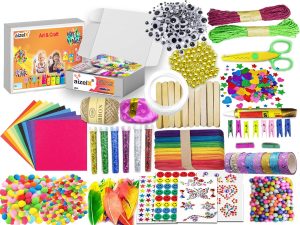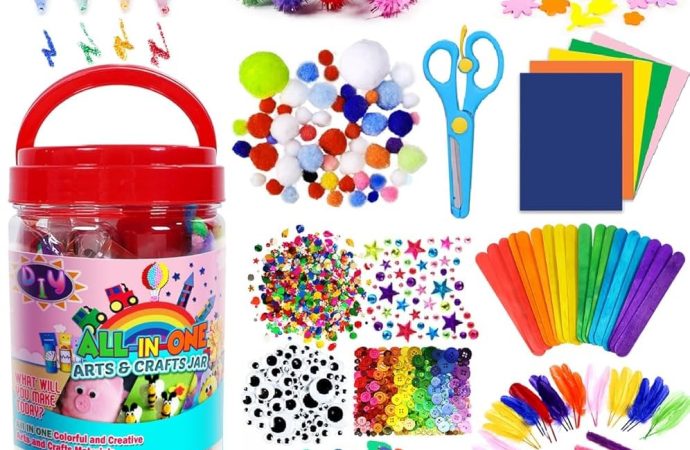Why Crafting Materials are Making a Comeback In recent years, the world has witnessed a remarkable resurgence in interest in art and crafting. From painting and knitting to jewelry-making and scrapbooking, the revival of these creative activities has led to a significant increase in the demand for crafting materials. This article explores the factors behind
Why Crafting Materials are Making a Comeback
In recent years, the world has witnessed a remarkable resurgence in interest in art and crafting. From painting and knitting to jewelry-making and scrapbooking, the revival of these creative activities has led to a significant increase in the demand for crafting materials. This article explores the factors behind this crafting renaissance, the economic and social implications, and provides a comprehensive analysis and comparison of the most popular crafting materials on the market today.

Amazon.com
The Rise of DIY Culture
The Influence of Social Media
Social media platforms such as Instagram, Pinterest, and YouTube have played a crucial role in the crafting boom. Influencers and hobbyists share tutorials, showcase their projects, and inspire millions of followers to try their hand at various crafts. Hashtags like #DIY, #Crafting, and #Handmade have amassed billions of views, creating a global community of crafters who share tips, ideas, and encouragement.
The Pandemic Effect
The COVID-19 pandemic forced many people to stay at home, leading to a surge in hobbies that can be done indoors. Crafting became a therapeutic escape for many, offering a sense of accomplishment and creativity in uncertain times. This period saw a dramatic increase in the sale of crafting materials as people sought new ways to occupy their time and express themselves.
Environmental and Ethical Considerations
There is a growing awareness of the environmental and ethical impact of mass-produced goods. Many individuals are turning to crafting as a way to reduce waste, recycle materials, and create sustainable, handmade items. This shift towards conscious consumption has boosted the popularity of eco-friendly crafting materials.
Economic Impacts of the Crafting Boom
Market Growth
The crafting industry has experienced significant growth in recent years. According to market research, the global arts and crafts market size was valued at approximately $40 billion in 2020 and is projected to grow at a compound annual growth rate (CAGR) of around 6% from 2021 to 2027. This growth is fueled by the increasing number of hobbyists and the rising popularity of handmade goods.
Small Business Opportunities
The surge in crafting has also led to a proliferation of small businesses and entrepreneurs. Platforms like Etsy provide a marketplace for artisans to sell their handmade products, allowing them to reach a global audience. This has not only empowered individuals to turn their hobbies into profitable ventures but also contributed to the economy by creating new job opportunities.
Challenges and Opportunities for Retailers
Retailers of crafting materials have had to adapt to the increased demand. While this presents an opportunity for growth, it also comes with challenges such as supply chain management and staying updated with the latest trends. Retailers that can offer a wide range of high-quality, innovative products are likely to thrive in this competitive market.
Analysis of Popular Crafting Materials
To understand the current trends in crafting materials, it is essential to analyze their popularity, cost, environmental impact, and availability. The following analysis table provides a detailed overview of some of the most popular crafting materials.
| Crafting Material | Popularity | Cost | Environmental Impact | Availability |
| Yarn | High | Affordable | Moderate (varies by type) | Widely available |
| Acrylic Paint | High | Affordable | Low (synthetic material) | Widely available |
| Resin | Medium | Moderate | High (plastic-based) | Widely available |
| Paper | High | Low | Low (recyclable) | Widely available |
| Fabric | High | Variable | Moderate (depends on type) | Widely available |
| Beads | Medium | Affordable | High (plastic beads) | Widely available |
| Clay | Medium | Affordable | Low (natural material) | Widely available |
| Wood | Medium | Moderate | Low (sustainable sources) | Widely available |
Comparative Analysis of Crafting Materials
The following comparative table highlights the key features of different crafting materials, allowing crafters to make informed choices based on their needs and preferences.
| Feature | Yarn | Acrylic Paint | Resin | Paper | Fabric |
| Versatility | High | High | Medium | High | High |
| Durability | Medium | High | High | Medium | High |
| Skill Level | Beginner to Advanced | Beginner to Advanced | Intermediate to Advanced | Beginner to Advanced | Beginner to Advanced |
| Eco-friendliness | Moderate (natural yarn) | Low (synthetic) | Low | High (recyclable) | Moderate (natural fibers) |
The Future of Crafting Materials
Technological Innovations
Advancements in technology are likely to influence the future of crafting materials. For instance, 3D printing is becoming more accessible, allowing crafters to create intricate designs with precision. Additionally, developments in biodegradable and eco-friendly materials are expected to shape the industry, catering to the growing demand for sustainable crafting options.
Customization and Personalization
The trend towards customization and personalization is set to continue. Consumers are increasingly seeking unique, handmade items that reflect their individual tastes and preferences. Crafting materials that offer flexibility and adaptability will remain in high demand as crafters look for ways to personalize their projects.
Educational Initiatives
Educational initiatives aimed at promoting crafting among younger generations are crucial for sustaining the industry’s growth. Schools and community programs that teach crafting skills not only foster creativity but also ensure that the tradition of handmade art continues to thrive.
Conclusion
The resurgence in art and crafting materials is a multifaceted phenomenon driven by social media influence, the therapeutic appeal of crafting, environmental consciousness, and economic opportunities. As the crafting industry continues to evolve, it presents exciting possibilities for innovation and sustainability. Whether as a hobby or a business venture, crafting offers a creative outlet that brings joy, satisfaction, and a sense of accomplishment to millions around the world.
















